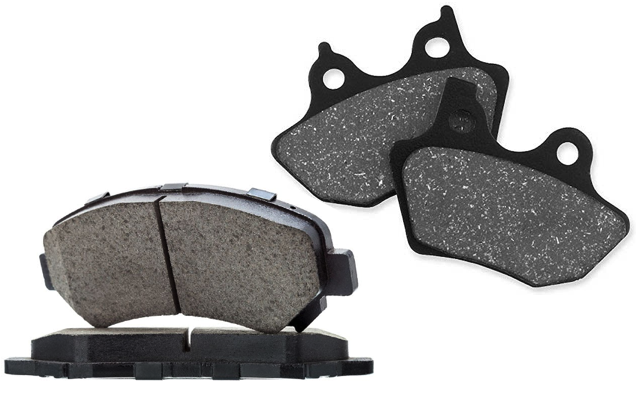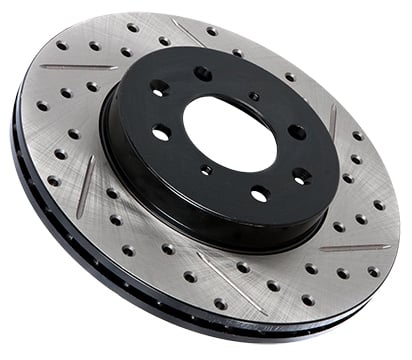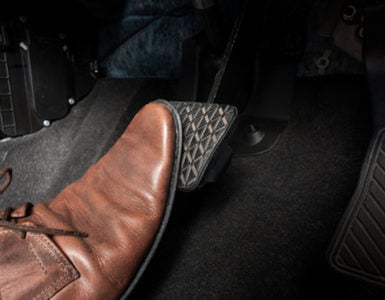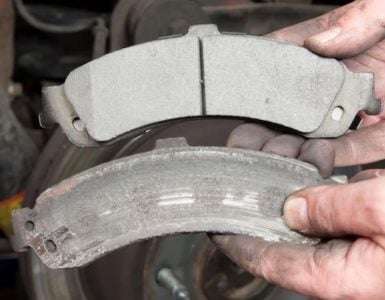Are you looking for a new set of brake pads? Are you trying to decide between organic and ceramic brake pads? If your answer to both questions is yes, this is the guide for you.
Ceramic Brake Pads Last Longer Than Organic Brake Pads

All other things being equal, ceramic brake pads last longer than organic brake pads. It’s because ceramic brake pads come with a much harder friction material formulation. Ceramic brake pads are actually the hardest and most durable brake pads on the market. They even last longer than metallic brake pads. Organic brake pads don’t usually last as long as the other two types of pads.
Don’t be so quick to write off organic brake pads, though. There’s a chance organic brake pads might even work best in your situation. To figure out which type of brake pads works best for you, take all the main factors into consideration.
Other Important Factors To Look For In Brake Pads
Longevity isn’t the only factor to consider while shopping for brake pads. Before getting a set of replacement brake pads for your vehicle, go over these following important factors:
1. Price

Of course, you need brake pads that fall within your budget. Don’t be so quick to get the cheapest pads you can find, though. Brake pad pricing and durability go hand in hand. So ceramic brake pads cost more than organic brake pads of equal quality.
2. Noise
If you’re concerned about brake pad noise, you want to get a set that creates the least noise. The thing is, the amount of noise your brake pads produce depends on several factors:
- Rotor compatibility
- Brake pad quality
- The amount of metals in the pads (metallic brake pads are usually the noisiest type)
3. Dust
If brake pad dust is important to you, try to get a set that doesn’t create a lot of dust. Organic brake pads create more dust than ceramic brake pads. You should also take into consideration your braking habits. No matter what kind of pads you use, they will create some dust if a lot of heavy braking is involved.
If your driving style demands lots of heavy braking, you may want to upgrade to a towing or high performance brake pad and rotor kit.
4. Quality
If you have the budget for it, always get quality brake pads. That means buying premium or heavy duty pads instead of basic economy pads. Quality plays a big part in how long your brake pads will last. Ceramic pads usually last longer than organic pads. Yet, high quality organic pads will last longer than low quality ceramic pads.
When you shop with us, you don’t have to worry about quality. We make a point to only carry high quality brake pads from reputable brands. Check out our selection of brake pads here!
5. Functionality
You want to consider how you’re going to use your brake pads. Is your vehicle a daily driver? Or do you use your vehicle only for short trips and on special occasions? Also, do you live in a wet climate? All these questions matter a lot.
Get organic brake pads if:
- You want to save money
- You only use your vehicle for short trips
- You live in a dry climate when it never or rarely rains
- Organic brake pads don’t heat up or stop well in wet weather. Ceramic and metallic pads are more ideal for driving in wet weather. These pads contain metals that heat up quickly.
Ceramic brake pads work well in any situation. They may cost more than organic pads, but they’re much more versatile. Still, it’s up to you to decide if a set of ceramic brake pads are worth the extra cost.
There’s a factor we haven’t discussed yet, and it’s perhaps the most important factor to consider:
Rotor Compatibility Is The #1 Factor To Consider

It’s important to know which brake pads your rotors are designed for. Often times, the issues associated with brake pads (noise, dust, etc.) can be attributed to rotors that are incompatible with the pads being used. For example, if your rotors are designed for ceramic brake pads, and you use metallic pads, you may notice excessive noise and dust.
So before deciding on a set of brake pads, make sure you know which type(s) of pads are compatible with your rotors. If you’re not sure where to find this information, we may help with that if you contact us.


